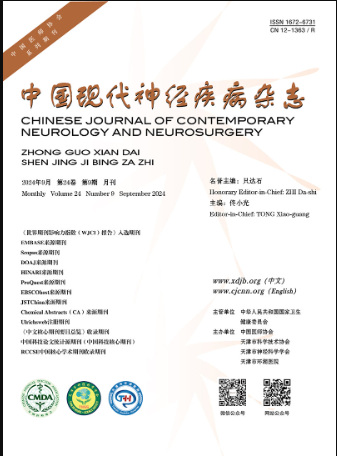A rare case of sleep - related rhythmic movement disorder in adult with literature review
Q4 Medicine
引用次数: 0
Abstract
Sleep - related rhythmic movement disorder (RMD) is characterized by repetitive,stereotyped and rhythmic motor behaviors (not tremors) that occur predominantly during drowsiness or sleep and involve large muscle groups. The onset of RMD is typically in early childhood, rarely continue into adolescence and adulthood. This paper retrospectively analyzed the diagnosis and treatment in a case of adult-onset RMD. A 76 -year-old male mainly presented rhythmic forehead banging during sleep. The number of forehead banging ranged from dozens to tens of seconds, pause seconds after the second attack, lasting 1 to 2 h and can not be recalled after waking up. Polysomnography (PSG) showed sleep efficiency decreased, awakening time prolonged, times of wakefulness increased, sleep structure disordered, non-rapid eye movement (NREM) 1 and 2 sleep increased, rapid eye movement (REM) sleep decreased, sleep latency of REM prolonged. Apnea hypopnea index (AHI) was 8.40. Several abnormal behavior attacks were observed, each attack lasting 3 to 18 s, 0.60 to 1.20 Hz, total time lasting 6 min. The diagnosis was RMD, clonazepam 0.50 mg/night and pramipexole 0.0625 mg/night were given and the result of 33 months follow-up showed effective. By literature review, we know the clinical features, diagnosis and treatment of RMD. We also analyze the reasons of misdiagnosis for reducing diagnostic errors and mistreatments. DOI: 10.3969/j.issn.1672-6731.2017.09.008成人睡眠相关节律性运动障碍1例并文献复习
睡眠相关节律性运动障碍(RMD)的特征是主要发生在困倦或睡眠期间,涉及大肌肉群的重复、刻板和节律性运动行为(不是震颤)。RMD的发病通常在儿童早期,很少持续到青春期和成年期。本文回顾性分析1例成人发病的RMD的诊断和治疗。76岁男性,睡眠时主要表现为有节奏的前额叩击。额头敲打次数从几十秒到几十秒不等,第二次发作后暂停数秒,持续1 ~ 2小时,醒来后无法回忆。多导睡眠图(PSG)显示睡眠效率下降,觉醒时间延长,觉醒次数增加,睡眠结构紊乱,非快速眼动(NREM) 1、2期睡眠增加,快速眼动(REM)睡眠减少,REM睡眠潜伏期延长。呼吸暂停低通气指数(AHI)为8.40。观察到多次异常行为发作,每次发作持续3 ~ 18s, 0.60 ~ 1.20 Hz,总时间6 min。诊断为RMD,给予氯硝西泮0.50 mg/夜,普拉克索0.0625 mg/夜,随访33个月有效。通过文献回顾,了解了RMD的临床特点、诊断和治疗方法。并分析误诊的原因,以减少误诊和误治。DOI: 10.3969 / j.issn.1672-6731.2017.09.008
本文章由计算机程序翻译,如有差异,请以英文原文为准。
求助全文
约1分钟内获得全文
求助全文

 求助内容:
求助内容: 应助结果提醒方式:
应助结果提醒方式:


